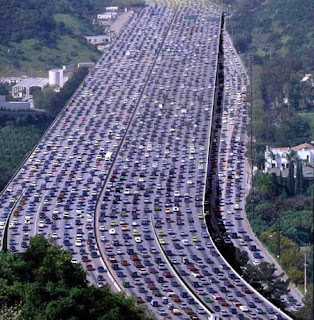
On the heels of the recent massive traffic jam in China, Oddee ran a great post today entitled "12 Worst Traffic Jams." Don't get me wrong: cars are great ways to get people and things moved from Point A to Point B. This doesn't need to be an either/or story. But without multi-modality, you get choke points that, if a few things break the wrong way, can grind everything to a halt, with disastrous consequences for supply chains and personal mobility. We know as investors to not put all our eggs in one basket; let's hope we apply the same logic to the way we think about moving people and things.
(By the way, the photo is not of China, but of France, circa 1980, the purported site of the longest traffic jam ever, at 110 miles.)


3 comments:
Wow. I heard about that traffic jam. Completely ridiculous.
On a not-quite-related note, last weekend a friend and I drove to Chicago in order to bring his younger sister's belongings to her new college in Wheaton. The road trip was fun, but somehow it seemed inefficient to take our own car basically from city center to city center. I couldn't help but wonder if it would have been more efficient (and involved fewer speeding tickets in Ohio) to take a high-speed train of comparable cost, if such a thing existed. I think it would have been.
I read in another article somewhere (a NY Times blog I think) that truck drivers were being *threatened* by these water and food vendors, i.e., buy our food/water now, at the price we demand, or we'll damage your truck. This does not sound at all implausible to me.
Does the writer in Marginal Revolution not have this info? If people are really being extorted because they are stuck in a massive jam with no way for law enforcement to really police the area sufficiently, his comment about "what is the market price..." seems distastefully glib to me.
But anyway. End of tangent.
Nicholas - I'm pretty sure Amtrak runs from Philly to Chicago. It may not be 250+ mph like the AGV in France, but it gets you from Point A to Point B without much hassle. That said, 1) with the exception of the NE Corridor, trips from big cities to big cities aren't very frequent, 2) Americans seem to want their car on both ends of the trip, and 3) getting to and from train stations without a car is an adventure in most cities (see #2). Hence, I'm skeptical there's sufficient traction/will for really good, European-style city-to-city high-speed rail.
Joel - I won't claim to speak for Tyler Cowen but as an avid reader of his I will note that these kinds of episodes are exactly what interest him in terms of the intersection of economics to real life situations; and the fact that there may be threats and extortion probably makes this even more fascinating and relevant to him as a case study.
Post a Comment